Rebuttal How Do JW's Get The 144000 So Wrong? | Good Fight Ministries Youtube channel | Rebuttal
- Thread starter SC Facilitator
- Start date
You are using an out of date browser. It may not display this or other websites correctly.
You should upgrade or use an alternative browser.
You should upgrade or use an alternative browser.
I scrolled through the transcript of that video, and found some illogical reasonings, twisted conclusions, as well as inaccurate statements about JW beliefs.
I do not agree with what the Watchtower teaches on everything because Watchtower takes scriptures out of context, but they're not wrong on everything.
Revelation is given in signs. Some are literal, and some are figurative. The context, the rest of the Bible, and holy spirit make clear whether it's literal or figurative.
The 144,000 in Revelation are contrasted with a great crowd that no one can number, which lends to the number being literal.
The description of the assignment of the 144,000 as being priests also is evidence that it's a literal number. The Bible books of Exodus, Leviticus, Numbers, and Deuteronomy show that the people were numbered and a specific number of people were set aside to fill the role as priests. Those priests had to match the number of firstborn because they served in their stead, in fact, when there was a discrepancy between the number of firstborn and number of Levites, there was a ransom fee that was paid on a per person basis to compensate. The number had to be exact.
Humans weren't meant to live in heaven. The 144,000 are a new creation in that they were not part of the creations made prior to Adam's fall.
The 144,000 are not literal virgins. They are virgins in that they don't spiritually prostitute themselves for selfish gain/prominence/etc like the pharisaical religious hypocrites in the Watchtower hierarchy or other clergy do.
The 144,000 are not all male. Paul spoke about both male and female being part of the priestly arrangement.
Some of the reasons people don't like hearing about the 144,000 being literal is they think it means the 144,000 are more "special" or something, but they're not. Levi was probably the worst of his brothers - he was harsh and killed all those people at Shechem. But Jehovah was showing that if He can forgive even somebody really naughty, He can forgive others too.
Jehovah and Jesus will be coming to the earth. "All things are possible with God." There is no need for people to be jealous of those who have to go work as part of the 144,000. The priests in ancient times worked among the people. The angels can materialize. Jesus materialized a body and hung out after he was resurrected. Jehovah can do the same. We'll all be working together. God is healing the family.
Praise Jah.
I do not agree with what the Watchtower teaches on everything because Watchtower takes scriptures out of context, but they're not wrong on everything.
Revelation is given in signs. Some are literal, and some are figurative. The context, the rest of the Bible, and holy spirit make clear whether it's literal or figurative.
The 144,000 in Revelation are contrasted with a great crowd that no one can number, which lends to the number being literal.
The description of the assignment of the 144,000 as being priests also is evidence that it's a literal number. The Bible books of Exodus, Leviticus, Numbers, and Deuteronomy show that the people were numbered and a specific number of people were set aside to fill the role as priests. Those priests had to match the number of firstborn because they served in their stead, in fact, when there was a discrepancy between the number of firstborn and number of Levites, there was a ransom fee that was paid on a per person basis to compensate. The number had to be exact.
Humans weren't meant to live in heaven. The 144,000 are a new creation in that they were not part of the creations made prior to Adam's fall.
The 144,000 are not literal virgins. They are virgins in that they don't spiritually prostitute themselves for selfish gain/prominence/etc like the pharisaical religious hypocrites in the Watchtower hierarchy or other clergy do.
The 144,000 are not all male. Paul spoke about both male and female being part of the priestly arrangement.
Some of the reasons people don't like hearing about the 144,000 being literal is they think it means the 144,000 are more "special" or something, but they're not. Levi was probably the worst of his brothers - he was harsh and killed all those people at Shechem. But Jehovah was showing that if He can forgive even somebody really naughty, He can forgive others too.
Jehovah and Jesus will be coming to the earth. "All things are possible with God." There is no need for people to be jealous of those who have to go work as part of the 144,000. The priests in ancient times worked among the people. The angels can materialize. Jesus materialized a body and hung out after he was resurrected. Jehovah can do the same. We'll all be working together. God is healing the family.
Praise Jah.
Well reasoned @EasyPrompt! I've been trying to work out why do they say they have not been with women and they say virgins. If that is meant to be taken that "don't spiritually prostitute themselves for selfish gain/prominence" why state "who have not been defiled with women"?
Here is the passage and some commentary that's helping me. It's just commentary so I'm still wrestling with it a bit. All I do know is that anointed believers in JC are not limited to 144k. The connection of anointed being equal to the 144k is weak and very eisegetical (not sure if that is a word).
The Lamb and the 144,000 on Mount Zion
14:1 And I looked, and behold, the Lamb standing on Mount Zion, and with him one hundred forty-four thousand who had his name and the name of his Father written on their foreheads.
2 And I heard a sound from heaven like the sound of many waters and like the sound of loud thunder, and the sound that I heard was like harpists playing on their harps.
3 And they were singing something like a new song before the throne and before the four living creatures and the elders, and no one was able to learn the song except the one hundred forty-four thousand who had been bought from the earth.
4 These are those who have not been defiled with women, for they are virgins. These are the ones who follow the Lamb wherever he goes. These were bought from humanity as first fruits to God and to the Lamb,
5 and in their mouth a lie was not found; they are blameless.
W. Hall Harris III et al., eds., The Lexham English Bible (Bellingham, WA: Lexham Press, 2012), Re 14:1–5.
14:4 have not been defiled with women This is holy war imagery; it indicates those who are ritually clean according to the Mosaic laws governing holy war (Deut 23:9–10; see 1 Sam 21:5 and note; note on Josh 6:16; note on Josh 6:17).
In 1 Sam 21:5, when David and his young companions flee from Saul, David proceeds to Nob and procures the bread of the Presence from Ahimelech, the priest, on the guarantee that the young men have remained sexually abstinent. Likewise, in 2 Samuel 11:11, David attempts to mask his adultery with Bathsheba by encouraging her husband, Uriah, to have sex with her. Uriah refuses because the ark of the covenant, Joab, and his comrades are in battle. He did not want to do anything to jeopardize their situation or bring reproach on their good faith.
for they are virgins Indicates that they have remained loyal to Christ and have not defiled themselves by compromising with the world (compare Rev 19:7–9; 2 Cor 11:2).
first fruits The offering of the firstfruits served as an acknowledgment to God for His gracious provision at harvest time (see Exod 23:16, 19). It communicated thankfulness and a sense of dependency from the person making the offering. It also signified that the entire harvest belonged to Yahweh. The people of God are presented in like manner.
14:5 blameless Like their Lord; they reflect His character and fidelity.
John D. Barry et al., Faithlife Study Bible (Bellingham, WA: Lexham Press, 2012, 2016), Re 14:4–5.
Here is the passage and some commentary that's helping me. It's just commentary so I'm still wrestling with it a bit. All I do know is that anointed believers in JC are not limited to 144k. The connection of anointed being equal to the 144k is weak and very eisegetical (not sure if that is a word).
The Lamb and the 144,000 on Mount Zion
14:1 And I looked, and behold, the Lamb standing on Mount Zion, and with him one hundred forty-four thousand who had his name and the name of his Father written on their foreheads.
2 And I heard a sound from heaven like the sound of many waters and like the sound of loud thunder, and the sound that I heard was like harpists playing on their harps.
3 And they were singing something like a new song before the throne and before the four living creatures and the elders, and no one was able to learn the song except the one hundred forty-four thousand who had been bought from the earth.
4 These are those who have not been defiled with women, for they are virgins. These are the ones who follow the Lamb wherever he goes. These were bought from humanity as first fruits to God and to the Lamb,
5 and in their mouth a lie was not found; they are blameless.
W. Hall Harris III et al., eds., The Lexham English Bible (Bellingham, WA: Lexham Press, 2012), Re 14:1–5.
14:4 have not been defiled with women This is holy war imagery; it indicates those who are ritually clean according to the Mosaic laws governing holy war (Deut 23:9–10; see 1 Sam 21:5 and note; note on Josh 6:16; note on Josh 6:17).
In 1 Sam 21:5, when David and his young companions flee from Saul, David proceeds to Nob and procures the bread of the Presence from Ahimelech, the priest, on the guarantee that the young men have remained sexually abstinent. Likewise, in 2 Samuel 11:11, David attempts to mask his adultery with Bathsheba by encouraging her husband, Uriah, to have sex with her. Uriah refuses because the ark of the covenant, Joab, and his comrades are in battle. He did not want to do anything to jeopardize their situation or bring reproach on their good faith.
for they are virgins Indicates that they have remained loyal to Christ and have not defiled themselves by compromising with the world (compare Rev 19:7–9; 2 Cor 11:2).
first fruits The offering of the firstfruits served as an acknowledgment to God for His gracious provision at harvest time (see Exod 23:16, 19). It communicated thankfulness and a sense of dependency from the person making the offering. It also signified that the entire harvest belonged to Yahweh. The people of God are presented in like manner.
14:5 blameless Like their Lord; they reflect His character and fidelity.
John D. Barry et al., Faithlife Study Bible (Bellingham, WA: Lexham Press, 2012, 2016), Re 14:4–5.
REVELATION 14:1–5
The Lamb’s Elite Warriors
On the hill in the distance I could see the little procession, tiny but silhouetted against the sky in the bright Middle-Eastern evening. In my country the sheep are brought from one field to another by people with sticks and dogs. In the Middle East, to this day, the shepherd goes on ahead and the sheep follow him or her. They know the shepherd’s voice, but they also know that they can trust him or her to lead them to pasture, to water, to safety. No sticks, or dogs, are required.
Jesus himself, of course, used this image of the shepherd in the tenth chapter of John’s gospel. And his call to people to ‘follow him’ is one of the most persistent commands he ever issued. One might almost say that, in the gospels, ‘following Jesus’ is the basic phrase which describes someone who belongs to Jesus, who believes in him (e.g. Matthew 4:19; 8:22; 9:9; etc.). But, in John’s gospel particularly, we find some poignant and striking passages on this theme. ‘Whoever serves me must follow me’, he said (John 12:26). Peter insists that he will follow Jesus absolutely anywhere, to prison or even to death (John 13:37; Luke 22:33), but Jesus solemnly warns him that he will in fact deny that he even knows him.
It is in that light that we read the immensely powerful passage in John 21 where Peter, after Jesus’ resurrection, tells Jesus three times that he loves him, and Jesus’ ultimate response is ‘Follow me!’ (21:19). Even then Peter has some questions: ‘Lord’, he says, looking at the Beloved Disciple following them, ‘what about this man?’ Jesus’ reply is one of the most famous one-liners in all the gospel, echoing through the hearts and minds of all who have struggled with vocation and wondered why things were working out the way they did. ‘If it is my will’, he replies, ‘that he remain until I come, what is that to you? Follow me!’ Don’t ask silly questions; just follow. Don’t worry about the others; you follow me. Don’t look back (Luke 9:62); follow me.
All that is in the background as we find, in this definition of the lamb’s elite warriors, the sentence: ‘They follow the lamb wherever he goes’ (verse 4). There is a sense in which nothing more needs to be said. The lamb has won the victory over the dragon and his sidekicks, through his own sacrificial death. Now he calls his people to put that victory into practice, by following him down the same path. Jesus had stressed this during his public ministry: if anyone wanted to come after him, they should deny themselves, take up their cross, and follow him. Somehow, the way to victory is the way of the cross. It was strange and challenging then, and it is just as strange and challenging today.
Who then are these ‘elite warriors’, as I’ve called them? What purpose is there in them suddenly being revealed at this point in the story? The answer is that John is once again working with Psalm 2. The nations rage, the peoples imagine foolish things, but God’s answer is to set his king, his son, ‘upon my holy hill of Zion’. Hence the mention of the lamb standing on Mount Zion in verse 1. We have seen the dragon becoming furious with the woman and her offspring, the younger brothers of the child who has been snatched up to heaven (12:5). We have seen the two monsters, the great imperial monster who comes from the sea and the local, secondary monster who emerges from the immediate community. They are the ones who, in Psalm 2, are raging and fuming, threatening and blaspheming. But now God is revealing his chosen king, and his chosen king is not alone. He is surrounded by his crack troops, his elite warriors. There is no doubt of their victory.
It is because they are elite warriors that (strictly within the bounds of the symbolism John is using) he speaks of them as ‘celibate’ or ‘virgins’. Ancient Israel had a clear policy about going to war; if war was justified, war was also holy, and those who fought in it had to obey special rules of purity, including abstention (for the time) from sexual relations (e.g. Deuteronomy 23:9–10; 1 Samuel 21:5). As usual, we need to be clear about the symbol and the reality to which it points. In the symbol, this body consists of a hundred and forty-four thousand (we have met them before, of course, in chapter 7); they sing a new song; they have abstained from sexual relations. They are, in other words, the ideal representatives of the people of God, permanently ready for battle. In the reality to which this symbol points, they are in fact a great company which nobody could count; the chances are that they sing songs which all Christians would know; and some of them may be married and some single—but all are permanently ready for the real battle, which is the engagement with the monsters and their demands, an engagement which may mean at any moment that they will be required to suffer or even to die.
These elite warriors serve, then, to encourage the small Christian groups who, faced with the monstrous might of Rome and its local supporters, would probably feel powerless and helpless. Not a bit of it, says John: the lamb has been enthroned, just as God promised, and his elite stand around him, ready for the battle in which, following the lamb himself, they are going to win the victory. They will be the conquerors. These are the ones who, instead of the brand of the monster, receive (not a mark, but actually) the name of God and the lamb on their foreheads. This will mark them out in pagan society, of course, once it is known that they are loyal to this name rather than to that of Caesar. But it will also mark them out in God’s presence as those whom the Messiah will acknowledge to be his (Matthew 10:32).
This great crowd, surrounding the lamb, is not the sum total of all believers. It is the beginning, the great advance sign of an even greater harvest to come. That is the point of the ‘first fruits’ image in verse 4. At the ancient Jewish harvest-time, the first sheaf of wheat (or whichever crop it might be) was offered to God as the ‘first fruits’, signifying the expectation and prayer that there would be much more on the way. Even so, these one hundred and forty-four thousand are to be an encouragement to the churches. Already there is a great multitude! The lamb is winning the victory! We can carry on patiently.
And the way they must do so is by following him, especially, in holiness of life. For John, one of the major features of the dragon’s whole system is the lie: he creates a world of untruth, a fake world, a sham system from top to bottom. But for the elite, no lie is ‘found in their mouths’. Like the lamb himself (Isaiah 53:9), they are without blemish in this respect, as in everything else. This remains a challenge to all those who claim to follow Jesus. Truth and lies may sometimes be hard to tell apart, but this is where we stand at the watershed. God’s victory is about the real world, the whole creation. The closer we are to God and to his lamb, the more we see everything clearly and should speak everything truthfully. The satan does his best work by keeping things out of people’s minds altogether. Where that fails, he persuades them to believe, and to pass on, lies. ‘It doesn’t matter; it’s only a little thing; God wouldn’t mind, really; those are only silly, narrow rules; don’t you know that God wants you to enjoy yourself?’ and so on. Following the lamb means rejecting the lie. Always and for ever.
Tom Wright, Revelation for Everyone, For Everyone Bible Study Guides (London; Louisville, KY: SPCK; Westminster John Knox, 2011), 122–126.
The Lamb’s Elite Warriors
As I watched, there was the lamb standing on Mount Zion, and with him were a hundred and forty-four thousand who had his name, and the name of his father, written on their foreheads. I heard a voice from heaven, like the sound of many waters, and like the sound of mighty thunder, and the voice I heard was like harpists playing on their harps. And they are singing a new song before the throne, and before the four creatures and the elders. Nobody can learn that song except for the hundred and forty-four thousand who have been redeemed from the earth. These are the ones who have never polluted themselves with women; they are celibate. They follow the lamb wherever he goes. They have been redeemed from the human race as first fruits for God and the lamb, and no lie has been found in their mouths. They are without blemish.
On the hill in the distance I could see the little procession, tiny but silhouetted against the sky in the bright Middle-Eastern evening. In my country the sheep are brought from one field to another by people with sticks and dogs. In the Middle East, to this day, the shepherd goes on ahead and the sheep follow him or her. They know the shepherd’s voice, but they also know that they can trust him or her to lead them to pasture, to water, to safety. No sticks, or dogs, are required.
Jesus himself, of course, used this image of the shepherd in the tenth chapter of John’s gospel. And his call to people to ‘follow him’ is one of the most persistent commands he ever issued. One might almost say that, in the gospels, ‘following Jesus’ is the basic phrase which describes someone who belongs to Jesus, who believes in him (e.g. Matthew 4:19; 8:22; 9:9; etc.). But, in John’s gospel particularly, we find some poignant and striking passages on this theme. ‘Whoever serves me must follow me’, he said (John 12:26). Peter insists that he will follow Jesus absolutely anywhere, to prison or even to death (John 13:37; Luke 22:33), but Jesus solemnly warns him that he will in fact deny that he even knows him.
It is in that light that we read the immensely powerful passage in John 21 where Peter, after Jesus’ resurrection, tells Jesus three times that he loves him, and Jesus’ ultimate response is ‘Follow me!’ (21:19). Even then Peter has some questions: ‘Lord’, he says, looking at the Beloved Disciple following them, ‘what about this man?’ Jesus’ reply is one of the most famous one-liners in all the gospel, echoing through the hearts and minds of all who have struggled with vocation and wondered why things were working out the way they did. ‘If it is my will’, he replies, ‘that he remain until I come, what is that to you? Follow me!’ Don’t ask silly questions; just follow. Don’t worry about the others; you follow me. Don’t look back (Luke 9:62); follow me.
All that is in the background as we find, in this definition of the lamb’s elite warriors, the sentence: ‘They follow the lamb wherever he goes’ (verse 4). There is a sense in which nothing more needs to be said. The lamb has won the victory over the dragon and his sidekicks, through his own sacrificial death. Now he calls his people to put that victory into practice, by following him down the same path. Jesus had stressed this during his public ministry: if anyone wanted to come after him, they should deny themselves, take up their cross, and follow him. Somehow, the way to victory is the way of the cross. It was strange and challenging then, and it is just as strange and challenging today.
Who then are these ‘elite warriors’, as I’ve called them? What purpose is there in them suddenly being revealed at this point in the story? The answer is that John is once again working with Psalm 2. The nations rage, the peoples imagine foolish things, but God’s answer is to set his king, his son, ‘upon my holy hill of Zion’. Hence the mention of the lamb standing on Mount Zion in verse 1. We have seen the dragon becoming furious with the woman and her offspring, the younger brothers of the child who has been snatched up to heaven (12:5). We have seen the two monsters, the great imperial monster who comes from the sea and the local, secondary monster who emerges from the immediate community. They are the ones who, in Psalm 2, are raging and fuming, threatening and blaspheming. But now God is revealing his chosen king, and his chosen king is not alone. He is surrounded by his crack troops, his elite warriors. There is no doubt of their victory.
It is because they are elite warriors that (strictly within the bounds of the symbolism John is using) he speaks of them as ‘celibate’ or ‘virgins’. Ancient Israel had a clear policy about going to war; if war was justified, war was also holy, and those who fought in it had to obey special rules of purity, including abstention (for the time) from sexual relations (e.g. Deuteronomy 23:9–10; 1 Samuel 21:5). As usual, we need to be clear about the symbol and the reality to which it points. In the symbol, this body consists of a hundred and forty-four thousand (we have met them before, of course, in chapter 7); they sing a new song; they have abstained from sexual relations. They are, in other words, the ideal representatives of the people of God, permanently ready for battle. In the reality to which this symbol points, they are in fact a great company which nobody could count; the chances are that they sing songs which all Christians would know; and some of them may be married and some single—but all are permanently ready for the real battle, which is the engagement with the monsters and their demands, an engagement which may mean at any moment that they will be required to suffer or even to die.
These elite warriors serve, then, to encourage the small Christian groups who, faced with the monstrous might of Rome and its local supporters, would probably feel powerless and helpless. Not a bit of it, says John: the lamb has been enthroned, just as God promised, and his elite stand around him, ready for the battle in which, following the lamb himself, they are going to win the victory. They will be the conquerors. These are the ones who, instead of the brand of the monster, receive (not a mark, but actually) the name of God and the lamb on their foreheads. This will mark them out in pagan society, of course, once it is known that they are loyal to this name rather than to that of Caesar. But it will also mark them out in God’s presence as those whom the Messiah will acknowledge to be his (Matthew 10:32).
This great crowd, surrounding the lamb, is not the sum total of all believers. It is the beginning, the great advance sign of an even greater harvest to come. That is the point of the ‘first fruits’ image in verse 4. At the ancient Jewish harvest-time, the first sheaf of wheat (or whichever crop it might be) was offered to God as the ‘first fruits’, signifying the expectation and prayer that there would be much more on the way. Even so, these one hundred and forty-four thousand are to be an encouragement to the churches. Already there is a great multitude! The lamb is winning the victory! We can carry on patiently.
And the way they must do so is by following him, especially, in holiness of life. For John, one of the major features of the dragon’s whole system is the lie: he creates a world of untruth, a fake world, a sham system from top to bottom. But for the elite, no lie is ‘found in their mouths’. Like the lamb himself (Isaiah 53:9), they are without blemish in this respect, as in everything else. This remains a challenge to all those who claim to follow Jesus. Truth and lies may sometimes be hard to tell apart, but this is where we stand at the watershed. God’s victory is about the real world, the whole creation. The closer we are to God and to his lamb, the more we see everything clearly and should speak everything truthfully. The satan does his best work by keeping things out of people’s minds altogether. Where that fails, he persuades them to believe, and to pass on, lies. ‘It doesn’t matter; it’s only a little thing; God wouldn’t mind, really; those are only silly, narrow rules; don’t you know that God wants you to enjoy yourself?’ and so on. Following the lamb means rejecting the lie. Always and for ever.
Tom Wright, Revelation for Everyone, For Everyone Bible Study Guides (London; Louisville, KY: SPCK; Westminster John Knox, 2011), 122–126.
Yes, it's clear that "Women" in the Bible is used to refer to more than just female humans.
Cities are referred to as women. A city that's never been conquered is called a "virgin."
Empires or nations are also referred to figuratively as women at times. "Babylon the Great" is spoken of as a woman. So are Jerusalem, Israel, Judah, etc.
Jehovah refers to his heavenly organization of angels collectively as a woman. Genesis 3:15 speaks of her, as does Revelation.
The book of Revelation is presented in symbols. Spiritual harlotry is contrasted with spiritual integrity.
Those who have the mark of the beast (means doing things Satan's way) are contrasted with those who are marked with having God's thoughts guide their actions.
The 144,000 are to be priests in the Kingdom arrangement. The 12 apostles were part of the foundation and are included in that number, and some of them were married men. They are "virgins" in that they don't spiritually prostitute themselves; in other words, their love is not for hire. They serve Christ out of love, not for pay. Their love can't be bought.
Song of Solomon talks about this kind of love: "Place me as a seal upon your heart, As a seal upon your arm, For love is as strong as death is, And exclusive devotion is as unyielding as the Grave. Its flames are a blazing fire, the flame of Jah. Surging waters cannot extinguish love, Nor can rivers wash it away. If a man would offer all the wealth of his house for love, It would be utterly despised.”
All Christians are "anointed" with holy spirit in the sense that Jesus pours the spirit out that we may reflect the light. The word "anointed" has been confused by the Watchtower and other sects of Christendom. "Anointed" can also mean selected for an assignment.
The "Jews" in Revelation means Christians. The 144,000 are said to come out of all Israel, which means they are 144,000 selected out of all Christians for a specific purpose. The "Jew" in Revelation is figurative, it's not literal. But the number 144,000 is literal.
In ancient Egypt, the dream Joseph interpreted for Pharaoh had seven cows and seven ears of grain, etc. The cows weren't literal. Neither were the grain ears. But the number was literal, and it was repeated twice for emphasis. It's the same with 144,000. It's literal.
Jesus is King of the Jews. Those who don't follow Jesus as King are not "Jewish" in the sense of Revelation. "Israel" means "contending along with God." Jacob was given that name. Christians are too. We aren't born "Christian." We contend and follow Christ and become Israel/Christian.
Especially Leviticus, but also Exodus and Numbers are full of directions that are specific to a subset of Israelites. Even though all Israel was under the Law covenant, only the specific subset of Levites/priests had to go through the installation sacrifices or other parts of the law process at the tabernacle/temple.
It's the same with the 144,000 arrangement. All Christians have Christ as head. The 144,000 are not "mediators." They are helpers in an assignment. The arrangement is from God.
Anyone fighting against God's arrangement as clearly stated in the Bible will be found fighting against God.
Cities are referred to as women. A city that's never been conquered is called a "virgin."
Empires or nations are also referred to figuratively as women at times. "Babylon the Great" is spoken of as a woman. So are Jerusalem, Israel, Judah, etc.
Jehovah refers to his heavenly organization of angels collectively as a woman. Genesis 3:15 speaks of her, as does Revelation.
The book of Revelation is presented in symbols. Spiritual harlotry is contrasted with spiritual integrity.
Those who have the mark of the beast (means doing things Satan's way) are contrasted with those who are marked with having God's thoughts guide their actions.
The 144,000 are to be priests in the Kingdom arrangement. The 12 apostles were part of the foundation and are included in that number, and some of them were married men. They are "virgins" in that they don't spiritually prostitute themselves; in other words, their love is not for hire. They serve Christ out of love, not for pay. Their love can't be bought.
Song of Solomon talks about this kind of love: "Place me as a seal upon your heart, As a seal upon your arm, For love is as strong as death is, And exclusive devotion is as unyielding as the Grave. Its flames are a blazing fire, the flame of Jah. Surging waters cannot extinguish love, Nor can rivers wash it away. If a man would offer all the wealth of his house for love, It would be utterly despised.”
All Christians are "anointed" with holy spirit in the sense that Jesus pours the spirit out that we may reflect the light. The word "anointed" has been confused by the Watchtower and other sects of Christendom. "Anointed" can also mean selected for an assignment.
The "Jews" in Revelation means Christians. The 144,000 are said to come out of all Israel, which means they are 144,000 selected out of all Christians for a specific purpose. The "Jew" in Revelation is figurative, it's not literal. But the number 144,000 is literal.
In ancient Egypt, the dream Joseph interpreted for Pharaoh had seven cows and seven ears of grain, etc. The cows weren't literal. Neither were the grain ears. But the number was literal, and it was repeated twice for emphasis. It's the same with 144,000. It's literal.
Jesus is King of the Jews. Those who don't follow Jesus as King are not "Jewish" in the sense of Revelation. "Israel" means "contending along with God." Jacob was given that name. Christians are too. We aren't born "Christian." We contend and follow Christ and become Israel/Christian.
Especially Leviticus, but also Exodus and Numbers are full of directions that are specific to a subset of Israelites. Even though all Israel was under the Law covenant, only the specific subset of Levites/priests had to go through the installation sacrifices or other parts of the law process at the tabernacle/temple.
It's the same with the 144,000 arrangement. All Christians have Christ as head. The 144,000 are not "mediators." They are helpers in an assignment. The arrangement is from God.
Anyone fighting against God's arrangement as clearly stated in the Bible will be found fighting against God.
Romans 11 explains how gentiles were grafted into the 144000 to replace the unbelieving Israelites. The 144,000 is the church before and after Christ up until they are sealed, dead or alive, just before the tribulation. You are correct in saying that the 144000 are not “special “ as Paul explained in 1 Corinthians 1:26,27,28,29 The 144000 are only the first fruits, there are two more groups , the millennium and second resurrection. The three measures of meal until all are leavened. Matthew 13:33 KJV . The church, before and after Christ are represented by two loaves of bread in Leviticus 23:17 KJV . The women in symbolic language are the harlot of Babylon and her daughters, she is the mother of harlots, Revelation 17:5 144,000 is a literal number and shows how rare a true Christian really is. I have posted articles here about this and other topics that go into things with more detail.
The kings and priests, the church becomes, has no male or female, no marriage, Galatians 3:26,28 Matthew 22:30 . Angels cannot procreate.
While in the flesh men and women have a role to live and will be judged on how well each performs. In the church agape is the most powerful and important gift of Yahwehs spirit. The destiny of each member of the church is to become an Elohim. Psalm 82:6 , John 10:34,35,36 To be recreated in the image of Christ who was created in the image of Yahweh. Romans 8:29 , 2 Corinthians 3:18 , 1 John 3:2 The innumerable multitude and the 144,000 are both in the first resurrection. The people of the millennium and all others will be in the second resurrection.
While in the flesh men and women have a role to live and will be judged on how well each performs. In the church agape is the most powerful and important gift of Yahwehs spirit. The destiny of each member of the church is to become an Elohim. Psalm 82:6 , John 10:34,35,36 To be recreated in the image of Christ who was created in the image of Yahweh. Romans 8:29 , 2 Corinthians 3:18 , 1 John 3:2 The innumerable multitude and the 144,000 are both in the first resurrection. The people of the millennium and all others will be in the second resurrection.
God does not approve of the teachings of demons.
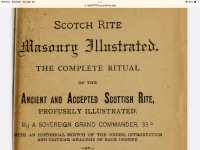
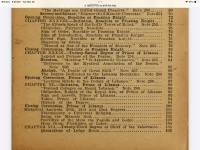
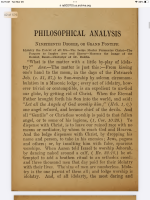
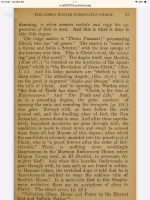 Satan is the one who taught that people become like God. Jesus's name is Michael, meaning "Who Is Like God?" because he would not for even a moment usurp God's place by coveting such a role. The idea of anyone becoming "Elohim" is a cabbalistic corruption from the demonic teachings of the synagogue of Satan.
Satan is the one who taught that people become like God. Jesus's name is Michael, meaning "Who Is Like God?" because he would not for even a moment usurp God's place by coveting such a role. The idea of anyone becoming "Elohim" is a cabbalistic corruption from the demonic teachings of the synagogue of Satan.
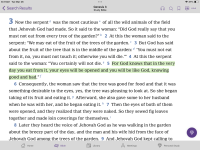
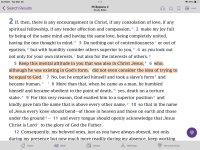



 Satan is the one who taught that people become like God. Jesus's name is Michael, meaning "Who Is Like God?" because he would not for even a moment usurp God's place by coveting such a role. The idea of anyone becoming "Elohim" is a cabbalistic corruption from the demonic teachings of the synagogue of Satan.
Satan is the one who taught that people become like God. Jesus's name is Michael, meaning "Who Is Like God?" because he would not for even a moment usurp God's place by coveting such a role. The idea of anyone becoming "Elohim" is a cabbalistic corruption from the demonic teachings of the synagogue of Satan.

1 Peter 1:4 The divine nature, that of Yahweh, this nature is agape and righteousness. You apparently think the word Elohim only refers to Yahweh. Check Strongs Concordance article H430 , an Elohim can be angels or humans. Jesus was an Elohim in the flesh. Yahweh will always possess HIS Omni attributes and be supreme over all . Jesus was created by Yahweh with this divine nature that Peter said we hope to attain. Do you not understand John 10:35 , Psalm 82:1,6 , Psalm 138:1 , Micah 4:5 , Deuteronomy 10:17
When Jesus quoted Psalm 82, he wasn't talking about judges being "righteous" or "loving" - he very clearly said some of those Jewish "judges" of old were judged by God as being unrighteous judges who were disciplined severely by Jehovah.
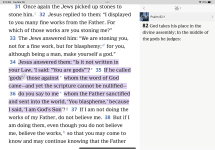
In the context you are referencing, Jesus was using the word "gods" to highlight the aspect of power. The judges had power because of their position.
The 144,000 will have power. Jesus has power. But they are not "God." When Jesus came to the earth, he had power but he wasn't "God in the flesh." Desiring to become like gods is part of freemasonry, a form of satanism. That is the goal of esoteric hermeticism, the 100th degree, like what CT Russell was.
Jehovah's goal is to heal the family. Whether a person lives on earth or in heaven, they will always be a "kid" compared to Jehovah.
"Becoming like gods" is not and should not be the goal of any true Christian.
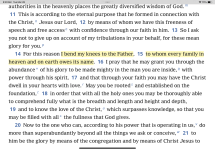

In the context you are referencing, Jesus was using the word "gods" to highlight the aspect of power. The judges had power because of their position.
The 144,000 will have power. Jesus has power. But they are not "God." When Jesus came to the earth, he had power but he wasn't "God in the flesh." Desiring to become like gods is part of freemasonry, a form of satanism. That is the goal of esoteric hermeticism, the 100th degree, like what CT Russell was.
Jehovah's goal is to heal the family. Whether a person lives on earth or in heaven, they will always be a "kid" compared to Jehovah.
"Becoming like gods" is not and should not be the goal of any true Christian.

Those who teach what is from darkness cannot understand the light.
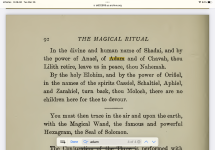
When Jehovah spoke from out of the darkness and made truth known to the people, no one could deny Him.
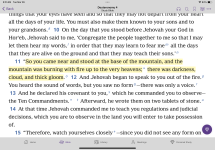
Jesus is king now, and he will use Jehovah God's holy spirit to expose all the works of darkness for what they are - corruptions of truth.
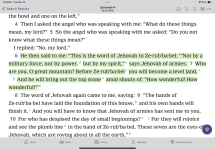

When Jehovah spoke from out of the darkness and made truth known to the people, no one could deny Him.

Jesus is king now, and he will use Jehovah God's holy spirit to expose all the works of darkness for what they are - corruptions of truth.

